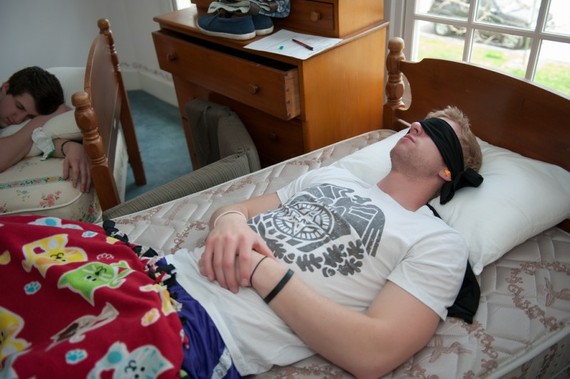Co-authored by Cara Constance, Associate Professor of Biology at Hiram College
Some college professors find it frustrating when students fall asleep in class. We actually require it. On the first day of our course on "The Science and Culture of Sleep," our students must try to take a nap under experimental conditions. The exercise forces them to recognize all of the many different factors--biological, environmental, cultural, interpersonal--that influence when, and where, and how one is able to fall asleep.
Sleep in American society is a complex phenomenon. It is a biological need--Sleep's timing is driven by our innate circadian rhythms--but the rhythms of modern society heavily determine its role in our lives. And these rhythms--whether about work or school schedules, the realities of working parents, or our capacity for global jetsetting--are often jarringly at odds with our biological sleep needs. The result? In the words of the famous sleep scientist William C. Dement, ours is a "sleep sick society" wherein many Americans are chronically sleep deprived.
To give students a clear understanding of something so complex as sleep in America requires a multi-faceted approach. We're fortunate that our sleep course is interdisciplinary and team-taught. It is the kind of class required as part of the core liberal arts curriculum at Hiram College in Northeast Ohio, and is part of our Hiram Health initiative--a campus-wide commitment to academic and wellness health programming. Cara Constance, a chronobiologist by training, introduces the class to the basics of circadian biology and the way sleep regulates myriad physiological processes. Erin Lamb, who teaches in Hiram's Biomedical Humanities major, the first of its kind in the nation, leads students to explore our cultural attitudes towards sleep--like our glorification of productivity embodied in the cautionary national icon of Rip Van Winkle--and the way these attitudes have shaped our 24-7 society.
We try to illuminate for students the significant stakes that different groups hold in the way we structure our time and our sleep. Drawing on the work of psychologist Amy Wolfson, we hold a mock townhall meeting to discuss delaying high school start times, with students assigned varying roles from working parents and student athletes to the district school bus transportation director to sleep scientists who can explain how adolescents experience a natural phase delay which, coupled with early mornings, leads to problematic sleep deprivation. We likewise hold a mock congressional hearing to debate the value of instituting workplace napping policies, and to invite students to think critically about who bears responsibility for addressing our sleep sick society.
Our course invites students to learn about themselves as well as about sleep by analyzing their own sleep habits. Students wear actigraphs for part of the course and keep detailed sleep journals to track their sleep patterns, caffeine intake, mood fluctuations, and various physiological and cognitive patterns influenced by circadian rhythms. In their final project, students analyze their personal data to determine changes they could make to improve their sleep hygiene, and how their sleeping patterns might be affected by future roles they desire (i.e., health care shift worker, soldier, parent).
In our years of teaching this course, we've found that college students aren't aware of just how integral sleep is to all aspects of their lives--whether to their health through the immune system and metabolism, or to their academic performance, memory and mood. They don't realize that the electronic screens they're so attached to can affect their sleep. They are shocked to learn that driving drowsy is just as dangerous as driving while intoxicated. They leave our class no longer able to take sleep for granted--and hopefully knowing enough about their own sleep needs to avoid napping in anyone else's class.
